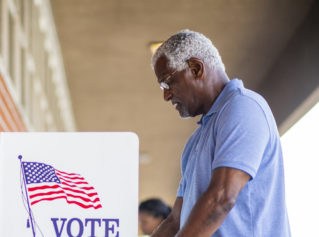
Proportional representation voting systems could change the political and racial balances of power inside the U.S. Capitol. (Source: Wikipedia)
With the debate over gerrymandering making its way through the Supreme Court, and voter suppression very much a reality, the issue of fair representation for Black people remains in need of solutions. This as the Voting Rights Act has been defanged of its enforcement mechanisms, and the rights of Black voters remain compromised. These circumstances provide fertile ground for the concept of proportional representation.
What is proportional representation? Consider the current system of legislative representation in America, in which one person represents one district in a single-member winner-take-all electoral district based on geography. Known as a First Past The Post (FPTP) system, it is notorious for excluding racial minorities. As Vox reported, although proportional representation may take various forms, there are a few popular proposals. For example, a party list system allocates seats based on the number of votes each party receives. This system has a track record of increasing inclusion of ethnic and racial minorities in South Africa, Indonesia and Namibia.
By contrast, in an alternative vote system each state is a single district with various members, rather than various districts each represented by one member. Voters rank the candidates for office, with a formula determining which of the candidates capture the fixed number of seats. Under mixed-member proportional (MMP) systems such as those in Germany and New Zealand, voters cast two votes: one for the party of their choice, and the second for the representative of their choice. When New Zealand adopted its system in 1996, the Maori members of Parliament doubled from 6 percent to 12 percent, and increased to 22 percent in 2014. Pacific Islander MPs increased from 3 percent of Parliament in 1996 to 6 percent in 2014, and Asian MPs grew from 1 percent to 4 percent.
Another system used in Ireland, Northern Ireland, Malta, local elections in Scotland and in the Australian Senate is the Single Transferable Vote (STV), which allows people to vote for a team of legislators rather by ranking them in order of preference. The voter places a number “1” next to their favorite candidate, a “2” next to their second-favorite candidate, and so on. STV eliminates the concerns over vote splitting or tactical voting, and increases the chances of electing independent candidates for office, as voters choose among candidates rather than parties.
Advocates of proportional representation note that it is a solution to gerrymandering, which is the drawing of legislative district boundaries for the benefit of one political party and to entrench its power. Both major political parties engage in the practice, but the Republicans have used it to their advantage over Democrats in recent years, including in 2016 races for the U.S. House and state house and assembly seats. Thanks to gerrymandering, Republicans control a majority of state houses and Congress. Although one forecast has the Democrats receiving 54 percent of the votes in the 2018 House election, they would win a mere 49 percent of the seats.
Nonwhite and women lawmakers are each less than 20 percent of Congress, while the Republican caucus in both the House and Senate is nearly exclusively white, and mostly white men, for that matter. The impact of gerrymandering — which allows politicians to select their voters rather than the other way around — dilutes nonwhite votes.
The effect of gerrymandering is evident in the South, where the sizable population of Black people is not reflected in the congressional delegations and state houses, in which the power of white conservative men is amplified, and Black voters have little to no political power. For example, non-Hispanic whites are 53 percent of the population of Georgia, while Blacks are 32 percent, Latinos are 9 percent, and Asians are 4 percent. Yet, of the 14 House districts in Georgia, white Republicans occupy 10 of these seats (71 percent), and Black Democrats hold the remaining four. Both of Georgia’s U.S. senators are white Republicans, and the state legislature is 72 percent white, 25 percent Black and 1 percent Latino.
In North Carolina, where whites are 63 percent of the state population, Blacks are 22 percent and Latinos 9 percent, only two of the state’s 13 members of Congress are Black, while 11 are white men, and 10 are white Republican men. Both U.S. senators are white Republicans. Whites are 79 percent of the state legislature, Blacks are 20 percent and Latinos 1 percent.
The population of Mississippi is 57 percent white and 38 percent Black, but its entire delegation of two senators and four members of Congress are white Republicans, except for one Black Democrat in the House. The state legislature is 71 percent white and 28 percent Black.
Alabama is two-thirds white and 27 percent Black, according to the Census, but six of its seven House members are white Republicans — the seventh is a Black woman and a Democrat — and its senators are white Republican men. Alabama’s state legislators are three-quarters white and 24 percent Black.
Under a system of proportional representation, Black voters would have more fair and equal representation in city councils, and state legislatures, Congress, and with an amendment to the Constitution, the Senate. James Madison advocated for proportional representation in the Senate, which small states opposed.
With a party list system, Black people in Alabama and North Carolina could each gain an additional seat in Congress, and increase their presence in their respective state assemblies. Proportional representation would transform politics in Georgia, a state which may very well be on its way to becoming a purple and eventually a blue state — and a majority-nonwhite state — due to demographic changes. Under a party list system, for example, Black Democratic voters, in coalition with Latinos, Asians and progressive whites, could increase their representation in Congress by at least two members, possibly even taking over half of the Georgia’s congressional delegation. Georgia could also gain its first Black U.S. senator if elections for the upper house were governed by proportional representation. Similarly, Blacks and other nonwhite Georgians could capture nearly half of the state legislature.
Mississippi is the blackest state in the U.S. in terms of its percentage of African-Americans, and also the most conservative state, where race and party affiliation are highly correlated. If the state adopted a party list system, the Black electorate could gain one additional member of Congress — possibly its first Black senator since Reconstruction — and would increase its number of combined seats in both houses of the state legislature from approximately 49 to 66, out of 174 total seats.
Harvard law professor Lani Guinier has long been a champion of the concept, which is found in most the world’s democracies and ensures the minority has at least some representation. Guinier has also maintained that proportional representation would encourage participation, genuine debate and inclusion — as opposed to tokenism —which race-conscious districts, she argues, do not achieve. Guinier was lambasted for her ideas, which Republicans and moderate Democrats dismissed in 1993 as a quota system when Bill Clinton torpedoed her nomination to head the Justice Department’s Civil Rights Division.
While Guinier was characterized as a radical for her voting rights positions, the inadequacies of the current political system — which only magnifies white supremacist power — suggest the nation must consider a bold alternative. Although proportional representation is not a panacea for the myriad problems in U.S. government, its electoral system or its politics, it would prove responsive to the needs of the underrepresented, those such as Black voters who have been denied access to power and whose interests have not been served.


